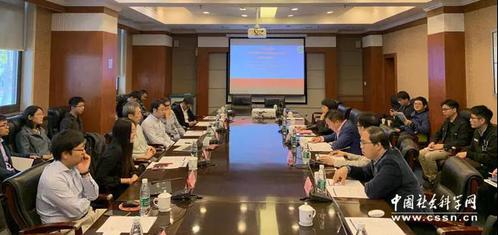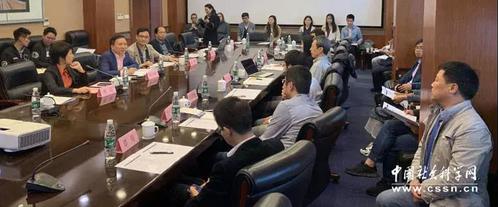Professor Wang Yongjin was Invited to the "High-end Forum on World Economy and International Economics"
2019-11-11

(Correspondent: Lu Yamei) From October 22 to 24, the High-end Forum on World Economy and International Economics was held at Southeast University, and more than 60 experts and scholars attended the seminar. The conference was co-sponsored by the School of Economics and Management of Southeast University, the Journal of World Economy Publishing House, Economic Perspectives Publishing House, the Department of International Economics and Trade, School of Economics and Management, Southeast University, the Institute of International Economics of Southeast University, and the Jiangsu Economic Globalization Research Center. Experts and scholars from the University of Tokyo, Japan, Nankai University, Shanghai University of Finance and Economics, Nanjing University, Southeast University, Nanjing University of Finance and Economics, Jiangsu Social Science Association, the Journal of World Economy Publishing House and Economic Perspectives Publishing House conducted in-depth discussions and exchanges on the frontier issues of international economic trade such as import and export, export and innovation.
Xu Zhishun, Vice Chairman of the Jiangsu Provincial Social Science Association, Zhu Hong, Deputy Party Secretary of the School of Economics and Management of Southeast University, Wang Hui, Editor of the Journal of World Economy, and Hongjun Liu, Editor of Economic Perspectives, delivered speech at the opening ceremony of the conference. Qiu Bin, Distinguished Professor of Southeast University, Leading Talent of 333 Science and Technology in Jiangsu Province, and Director of the Institute of International Economics of Southeast University hosted the opening ceremony.
Many well-known experts at home and abroad have discussed the most cutting-edge issues such as service trade, advanced manufacturing and modern service industry integration and open system rules, exchanged the latest research results, collided with academic thoughts, and launched high-level academic achievements. The forum would provide theoretical support and intellectual support for the development of Jiangsu's open economy, and promote further reform and opening up.

Taiji Furusawa, Professor of the University of Tokyo, Secretary-General of the Asia-Pacific Trade Forum, Professor Wang Yongjin of the School of Economics of Nankai University, and Tan You, an associate professor of the School of International Economics and Trade of Nanjing University of Finance and Economics, spoke in the first stage of the keynote report. Assistant Professor Wang Zi from School of Business at Shanghai University of Finance and Economics, Professor Yu Jinping from Nanjing University Business School, Yan Zhijun from Nanjing Normal University Business School, Dr. Qiu Bin and Dr. Zhang Liang, Distinguished Professors of Southeast University, spoke in the second stage of the keynote report. The participating scholars believe that the current anti-globalization trend is surging, multinational production networks and R&D networks are affected by political factors, and the impact of dynamic changes in production and innovation networks has become a hot topic in the frontiers of international economics. It is of great value to deepen the understanding and research of the frontier development of international economics in the academic world and provide certain theoretical references and policy references for relevant policy formulation.
Based on Japanese production network data and heterogeneous enterprise production outsourcing models, Taiji Furusawa studied the spatial and industrial structure of Japanese companies' production networks and their influencing factors—for example, differential inputs are unlikely to come from distant regions or abroad, and therefore explained the changing trend of enterprises from offshore outsourcing to domestic and foreign packages, and pointed out that global procurement may be a factor leading to trade localization and industrial agglomeration. Wang Yongjin studied the import effect brought by the export network--due to information asymmetry, the company's import decision will be affected by its import experience, and it is more likely to import from the market near its export destination--and analyzed the mechanism behind this phenomenon by using the import and export network dynamic model. Tan used the data to find out the reverse trend of the middle-price trade and carry trade (Carry-Along Trade) after China's accession to the WTO, and established a general equilibrium model to explain the typical fact.